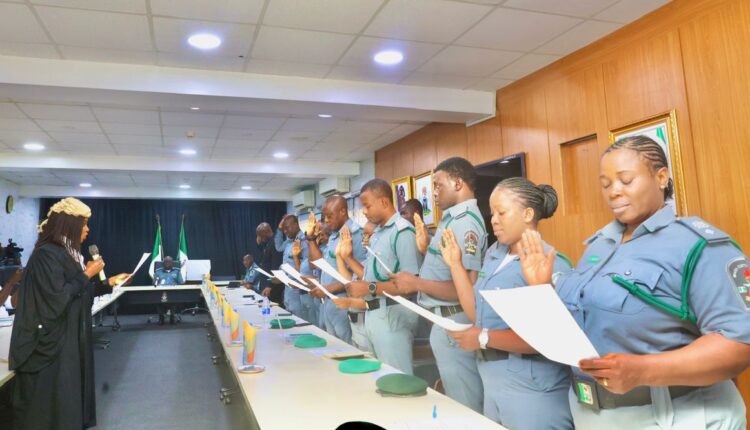CGC Adeniyi Reads Riot Act To Newly Inaugurated ACTU Members
As part of ongoing efforts to enhance integrity and transparency in Customs operations, the Comptroller-General of Customs (CGC), on Thursday, 25 July 2024, read a riot act to the Anti-Corruption and Transparency Unit (ACTU) members at the Nigeria Customs Headquarters in Abuja shortly after the inauguration.
According to a statement on Saturday, this initiative follows the recent partnership between the Nigeria Customs Service (NCS) and the Independent Corrupt Practices and Other Related Offences Commission (ICPC).
Represented by the Deputy Comptroller-General of Customs (DCG) in charge of Enforcement, Investigation, and Inspection, Aliyu Alajogun, the CGC emphasised the importance of tackling corruption and other related offences head-on.
Addressing the ICPC delegation, DCG Alajogun stated, “We are tasked with ensuring that our operations are free from corruption and that we uphold the highest standards of ethical conduct in all our dealings to ensure a far-reaching impact on our economic stability and international reputation.”
He urged the newly inaugurated members to adhere to the standards of their new roles, adding, “You are the frontline defenders against corruption and environmental degradation. Each of you has been selected for your expertise, integrity, and dedication to public service. Together, you will lead initiatives that foster accountability and restore public trust.”
He continued, “As you embark on this journey, always remember that your efforts contribute to the Nigeria Customs Service and the larger objective of preserving our environment for future generations. I urge you to embrace collaboration with other stakeholders, leverage technology, and enact innovative strategies to combat environmental crimes.”
- Advertisement -
On behalf of the ICPC, Olusegun Adigun, the Acting Director of the System Study and Review Department, praised the Comptroller-General of Customs for his commitment to enhancing the transparency and integrity of the Service through this partnership, which led to the inauguration of the new ACTU members.
“I must commend the Comptroller-General of Customs for today’s inauguration,” he remarked. “It is hoped that this event will empower the unit to deliver on its mandate, which includes periodic staff training on anti-corruption and the examination of system processes.”
Adigun charged NCS Anti-Corruption and Transparency Unit members to maintain integrity, exercise their duties responsibly, and avoid any form of oppression as they fulfil the strategic roles expected of them.
Expressing the Commission’s gratitude to the Nigeria Customs Service for making the event a reality, he added, “We hope that achieving our collective vision will assist in building strong institutions for the overall good of our great nation.”
Corroborating this, the newly inaugurated ACTU Chairman, Comptroller of Customs Intelligence Unit (CIU), Comptroller Emmanuel Osogba, pledged to implement policies aimed at enhancing the transparency of Customs operations across the Service’s formations while maintaining NCS standards.
“Our focus will be on establishing clear guidelines for transparency, enhancing mechanisms for reporting misconduct, and engaging with different departments and units within the Service to foster trust and participation,” Comptroller Osogba said. “Together, we can create a legacy of integrity and transparency that engenders a positive perception among the public and improves our rating on the transparency and integrity index—a legacy that future generations will cherish.”
The newly inaugurated ACTU members took the Oath of Allegiance, administered by Barrister Nkem Ezenwa, Director of the Anti-Corruption Unit. Their tenure will span three years, after which a new regime will be appointed.




Comments are closed.